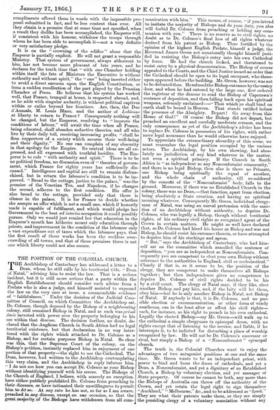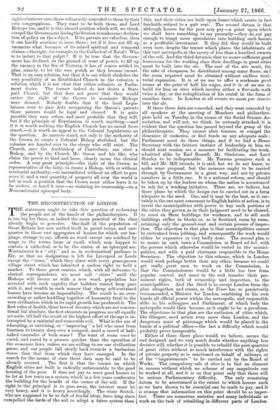THE POSITION OF THE COLONIAL CHURCH.
mHE Archbishop of Canterbury has addressed a letter to a 1 Dean, whom he still calls by his territorial title, " Dean of Natal," advising him to resist the law. That is a serious incident, but it is still more serious that a party within the English Establishment should consider such advice from a Prelate who is also a judge, and himself assisted to expound the law on the very case at issue, a commendable evidence of " faithfulness." Under the decision of the Judicial Com- mittee of Council, on which Committee the Archbishop sat, Dr. Colenso, though deposed by the Bishop of a neighbouring colony, still remained Bishop in Natal, and as such was prioul facie invested with power over the property belonging to his see within that diocese. The decision further, no doubt, de- clared that the Anglican Church in South Africa had no legal territorial existence, but that declaration in no way inter- fered with the rights which attached to Dr. Colenso as a Bishop, and for certain purposes Bishop in Natal. So clear was this, that the Supreme Court of the colony, on the Bishop's petition, instantly replaced him in enjoyment of one portion of that property—the, right to use the Cathedral. The Dean, however, had written to the Archbishop contemplating this very claim, and the Archbishop in reply informs him, I do not see how you can accept. Dr. Colenso as your Bishop without identifying yourself with his errors. The Bishops of the Church. of England, I believe, with scarcely an exception, have either publicly prohibited Dr. Colenso from preaching in their dioceses, or have intimated their unwillingness to permit him to dd so. At any rate he.has not, so far as I am aware, preached in any diocese, except on one occasion, so that the great majority of the Bishops have withdrawn from all com- munication with him." This means, of course, " if you intend to imitate the majority of Bishops and do your duty, you also will forbid Dr. Colenso from preaching or holding any com- munion with you." There is no reserve as to civil rights, no doubt as to Dr. Colenso's final loss of all rights whatever derived from his patent as Bishop. Thus fortified by the opinion of the highest English Prelate, himself a judge, the Reverend James Green not unnaturally thought himself justi- fied in resisting the Bishop's entry into his own Cathedral by force. He had the church locked, and threatened to resist entry by a physical demonstration. The Bishop of course appealed to the Courts, and the Chief Justice issued an order that the Cathedral should be open to its legal occupant, who there- upon appeared before the building. Mr. Green, however, was not to be defeated thus. He refusedthe Bishop entrance. by thevestry door, and when he had entered by the large one, first ordered the registrar of the diocese to read the Bishop of Capetown's sentence of deposition, and then falling back upon his spiritual weapons, solemnly exclaimed:—" That which ye shall bind on earth shall be bound in Heaven. That stands ratified before the presence of the Almighty. Depart! Go away from this House of God!" Of course the Bishop did not depart, but preached an excellent and carefully moderate sermon, and the only consequence as yet of the Archbishop's advice has been to replace Dr. Colenso in possession of his rights, with rather more legal assurance than he would otherwise have enjoyed. To appreciate the extraordinary absurdity of this scene, we must remember the legal position occupied by the various actors. The Archbishop, by his own showing, had abso- lutely no jurisdiction of any kind whatever in the matter, not even a spiritual primacy. If the Church in South Africa is "as independent as any Nonconformist community," and there is no legal Bishop, then also is there no Primate, one Bishop being spiritually the equal of another, and the whole chain of authority, till re-soldered by the consent of the "Nonconformist" body, falls to the ground. Moreover, if there was no Established Church in the colony, there was no Dean,—that function, apart from election, being absolutely a State creation, and having no spiritual meaning whatever. Consequently Mr. Green, individual clergy- man of Natal, was using an unreal pretension with the sanc- tion of an Archbishop without authority, to deprive Dr. Colenso, who was legally a, Bishop, though without territorial rights, of his ordinary civil rights as recognized agent of the Crown in certain matters. He might as well have declared that, as Dr. Colenso had hired his house as Bishop and was not Bishop, he should resist his-entrance therein, or have attempted to deprive him of his stockings and apron.
" But," says the Archbishop of Canterbury, who had him- self sat on the committee which annulled the sentence of deposition, "you are as independent as Nonconformists. Con- sequently you are competent to elect your own Bishop without reference to the authorities in England, civil or ecclesiastical."
Clearly if that is, as it seems to be, the position of the clergy, they are competent to make themselves all Bishops together; but then independence gives no competence to deprive Dr. Colenso of civil rights decided to be his by a civil court. The clergy of Natal may, if they like, elect another Bishop and pay him, and, if the laity will let them, obey him—but he is only another Bishop in Natal, not Bishop of Natal. If anybody is that, it is Dr. Colenso, and no pos- sible election or excommunication, or other form of windy anathema, can in the least alter or affect his civil rights— such, for instance, as his right to preach in his own cathedraL Legally the elected Bishop--say Mr. Green—will walk up to the cathedral a simple clergyman in episcopal dress, with no rights except that of listening to the service, and liable, if he interrupts it, to be indicted for disturbing a place of worship recognized by law. He will not be Dr. Colenso's successor or rival, but simply a Bishop of a " Nonconformist " episcopal church.
The truth is, the Colonial Churches want to enjoy the advantages of two antagonist positions at one and the same time. Mr. Green wants to be an independent priest, with power to bind and loose the doors of cathedrals, and yet a Dean, a Nonconformist, and yet a dignitary of an Established Church, a Bishop by voluntary election, and yet manager of State property. Of course he cannot be both, any more than the Bishops of Australia can throw off the authority of the Crown, and yet retain the legal right to sign themselves "Auckland," "Melbourne," &c., and to be addressed as "Lord." They are what their patents make them, or they are simply the presiding clergy of a voluntary association without any rights whatever save those voluntarily conceded to them by their own congregations. They want to be both these, and Lord Bishops too, and it is this absurd position which will, we think, compel the Government duringthe Session to make some declara- tion of policy on the subject. If its patents are valueless, then it can hardly continue to issue them ; yet if it does not fill up vacancies what becomes of its mixed spiritual and temporal claims—the right, for example, to the Cathedral of Natal? Who is to induct to that pulpit ? If it be true that the Govern- ment has declined, on the ground of want of power, to fill up the vacancy in the See of Victoria, it has of course settled its plan, namely, to let the sees perish as they become vacant. That is an easy solution, but then it is one which abolishes the very possibility of an Established Church in the colonies, a solution which it is not clear that either colonists or Parlia- ment desire. The former indeed do not desire a State paid Church, but that does not prove that they would rather the right of the Crown to nominate Bishops were disused. Nobody doubts that if the local Legis- latures were to pass Acts recognizing the Queen's patents those patents would be legal and obeyed. It is quite possible they may refuse, and most probable that they will, but if the principle of Erastianism is worth anything,—and if it is worth nothing the English Church has no moral locus standi,—it is worth an appeal to the Colonial Legislatures on the question. As matters stand, not only is the authority of the Crown to create a Colonial Bishop abolished, but the colonies are handed over to the clergy who still exist. The Church, says the Archbishop of Canterbury, can elect a Bishop, and by the Church Mr. Green and his like, who claim the power to bind and loose, clearly mean the clerical order. A very great principle—the right of the Crown, as representative of the laity, to create a Bishop, with or without territorial authority,—is surrendered without an effort to pre- serve it, and a vast quantity of property all over the world is left in such a position that the Crown must either leave it to lie useless, or hand it over—so violating its trusteeship—to a Nonconformist episcopal body.



































 Previous page
Previous page